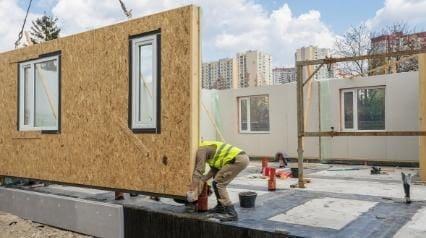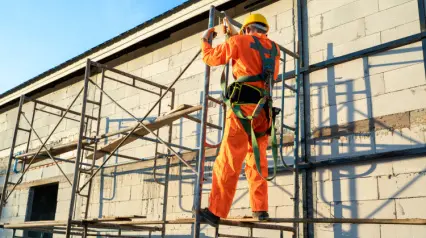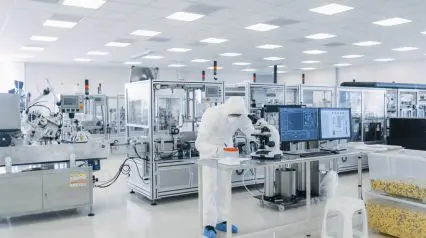What is Modular Construction?
Modular construction is a type of building design where each room or space is built separately. It can also refer to the actual building process, which relies on prefabricated modules. This means that walls, floors, ceilings, doors, windows, etc., are constructed independently.
This modular approach to building is ideal for small spaces, such as apartments, office units, dormitory units, identical classroom units, retail units, and townhouses. It also works well for large areas, such as offices, warehouses, and factories.
Modular construction is often used when there isn’t enough space for traditional construction methods. For example, a factory may need to be expanded, but the existing structure doesn’t allow for expansion. Or, a warehouse needs to expand, but the land is too expensive to purchase.
Types
There are two types of modular construction.
- Permanent – Permanent modular construction is used for long-term occupancies, such as offices, schools, and hospitals. The modules are placed on a concrete foundation and fastened together to create a permanent structure.
- Temporary – Temporary modular construction is used for short-term occupancies, such as fairs, tradeshows, and temporary housing. The modules are placed on a metal frame and can be disassembled and transported to another location.
What are the Advantages of Modular Construction?
Among the advantages of modular construction are the following:
Saves Time
Since the pieces are prefabricated off-site and then assembled quickly on-site after they have been delivered, modular construction reduces the amount of time needed for manual labor.
Eliminates Weather Delays
The modular structure is done under controlled climate conditions. This eliminates the possibility of weather delays and ensures that your project is finished efficiently and on time.
Saves Storage Space
Materials used in modular buildings are typically kept off-site. These materials don’t take up storage space and save money by reducing labor costs and purchases of new materials.
Reduces Labor Costs
Since modular building uses less on-site manual labor, it is possible to save money on construction costs. Even when you include additional costs like transportation and assembly, your project costs less overall.
Reduces Material Waste
Less waste is generated during modular construction since all raw materials are used in the prefabrication process. It helps to keep costs down and reduces the environmental impact of your project.
Challenges
Modular construction is not without its challenges. These include:
Limited Design Options
One challenge of modular construction is that it relies on mass production. It can limit the variety of design options available and make it challenging to create custom solutions.
Longer Design Phase
The modular construction process requires more complex decisions upfront during the design phase. The prefabrication process requires all aspects of the design to be decided before construction can begin.
Difficult Approval Process
The approval process for modular building can often be complicated since both local and state building codes may require additional inspections. It can add extra time to the overall project timeline and make it challenging to achieve your desired schedule.
Higher Supplier Risk
The modular construction process relies on a few suppliers to provide all necessary materials. It can increase the project’s overall risk and make it more challenging to recover from delays or problems.
Higher Transportation Costs
Transportation costs can also challenge modular construction since bringing materials to your project’s location is usually more expensive than on-site construction methods. It adds additional risk and makes it essential to correctly estimate transportation costs in advance.
Difficult Financing Process
The financing process for modular construction can also be more complicated since it is often considered a new and innovative method of construction. Traditional lenders may be hesitant to finance your project, which can lead to additional challenges.
When Is It the Best Option?
Several factors make modular construction the better solution. Here are some situations when modular construction is the best option:
- When time is of the essence – Modular construction is a much faster way to build than traditional construction methods. Most work is done in a factory setting, where weather and other site conditions are not factors.
- When you need to build in a remote location – Modular construction is perfect for building in remote areas where traditional construction methods would be logistically difficult or impossible.
- When you want a high level of quality control – Because modular construction takes place in a controlled factory environment, there is a higher level of quality control than that of traditional construction methods.
- When you want to be environmentally friendly – Modular construction is a very green way to build, as it creates far less waste than a traditional construction project.
- Whenever changes or additions are required – Because modular buildings are constructed in sections or building blocks, you can make changes or additions to the structure effortlessly and without starting from scratch.
The Future of Modular Construction
The modular construction industry is expected to grow in popularity in the coming years. This type of construction offers several advantages that make it the perfect solution for various situations. With its ability to be constructed quickly and efficiently, modular construction will revolutionize how we build in the years to come.
Some of the key trends in the future of modular construction include an increased focus on sustainability and green building practices and the development of new technologies that make modular construction faster, easier, and more precise. Prefabricated designs and solutions will likely continue to gain popularity, particularly for commercial buildings and large-scale projects. Additionally, as the cost of traditional construction methods continues to rise, modular construction will become increasingly more attractive as a more affordable alternative.
Overall, it is clear that modular construction is here to stay and will continue to grow as more people recognize its many benefits.
Digitize the way you Work
Empower your team with SafetyCulture to perform checks, train staff, report issues, and automate tasks with our digital platform.
Get Started for FreeModular Builds and SafetyCulture (formerly iAuditor)
Construction firms are opting more and more for modular construction. In terms of speed and efficiency, modular construction is unmatched. However, it’s still critical to have quality inspections and project management to ensure a successful project.
If you’re looking for a more efficient and effective way to manage your modular construction projects, SafetyCulture can help.




